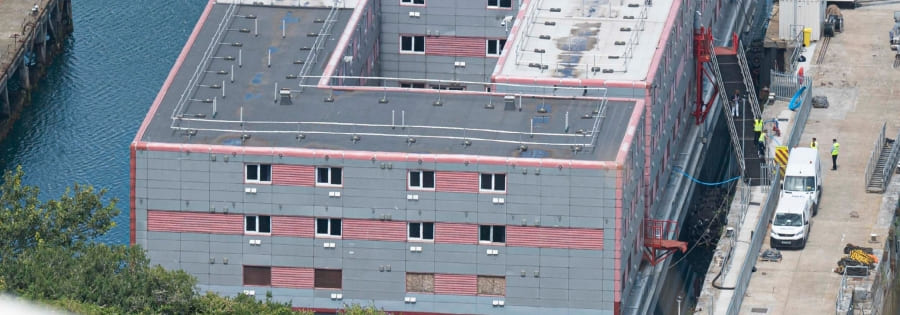Asylum: the backlog, small boats and the accommodation crisis
The asylum backlog — how it was allowed to grow and how to tackle it
An excellent piece in the FT by Georgina Quach (free to read) looks at how the asylum backlog grew and how it changed from one about initial claims to one about poor decision-making, appeals and withdrawals. She argues that looking at single aspects of the system won’t work, a new overview of the whole system is required, and tackling the problems will need more and better-trained staff.
“…the story that emerges is not simply of an influx of asylum applications, but of operational failings, where bad decision-making has ended up creating complex problems later down the line.”
In August, Yvette Cooper announced a new system for adjudicating appeals, with details promised in the Autumn. Then she announced £75 bonus payments to Home Office staff for faster decision-making, an “unambiguously terrible idea” according to a human rights lawyer.
Free Movement points out that, in 2022/23, 72 per cent of Home Office decisions were passing their own internal quality checks. In 2023/24, that had dropped to “an absolutely woeful” 52 per cent. Its chart shows the downward trend in the backlog of initial decisions. While welcome, this is based on “poor quality refusals” and hence a backlog of appeals.

A record 111,084 people applied for asylum in the UK during Keir Starmer’s first year in office, reflecting a surge in small boat arrivals to the country. The figure, for the year ending in June, marked a rise of 14 per cent from the 97,107 recorded during the same period a year before, according to data published on Thursday. It was also eight per cent higher than the previous peak in 2002.
Latest on ‘small boat’ arrivals
When it was revealed that the number of people who had reached the UK on small boats since Labour came to power in July 2024 had reached 50,000, the familiar circus of blame began, said Georgie Newson in the LRB Blog. Then, in August, the number of small boat crossings fell to 55, the lowest August level since 2019.
The New Statesman told the truth about the small boats “crisis” in a long article, which includes reports from Calais.

The Conservatives have claimed migrants from small boats are “24 times more likely to end up in prison”. But this figure is wrong “on so many levels”, says Monk Debunks. The Times was the first to report this story, shortly followed by the Express, the Daily Mail, and The Telegraph, before it became a talking point on GB News and Talk TV. But the only source — with no analysis — was the Conservative Party. However, a detailed analysis shows the exercise was an “easy manipulation of available statistics” and had no basis in reality. Journalists either chose not to check the figures, or didn’t bother to.
Use of asylum hotels is falling
The number of asylum seekers accommodated has fallen from a peak of 56,042 in 400 hotels in September 2023 to 32,345 in 210 hotels. The Home Office now promises a “big surge” in asylum hotel closures in the new year. This is set to put pressure on local council housing services. Bridget Young, director of NACCOM, said there was a “real and pressing concern” that the 2023 surge in homelessness would be repeated under the government’s current approach to asylum processing.
One of this month’s articles , by Kama Petruczenko of the Refugee Council, looks at legal developments around the use of the Bell Hotel in Epping. Simon Ricketts’ planning blog, Simonicity, has a lengthy review of the Epping case, which he calls “a whiff of the silly season but an even more pungent and worrying whiff of political opportunism”.
Conservative leader Kemi Badenoch called on Tory-led councils to take legal action against asylum hotels after the Epping council court case. Almost one in five asylum seekers housed in hotels are in Conservative-held councils, the FT pointed out. The Morning Star says the far right has won “a significant victory against asylum seekers”.
However, solicitor Victoria Searle said councils should be “mindful of the risk of stoking civil unrest” and highlighted that many councils use hotels for temporary accommodation. She told the Local Government Chronicle: “While the bringing of copycat claims may at first appear attractive, councils need to take care to consider unintended consequences.” Nevertheless, the LGC reported that West Northamptonshire and Spelthorne are pursuing similar legal action.
The FT investigated Britannia Hotels: “The company has built an empire on crumbling buildings and a government struggling to cope with a surge in migration.” (Free to read.) The BBC examined profits made by Clearspring Ready Homes.
Politico looked at the alternatives to hotels, including barracks, student accommodation and ordinary housing, including HMOs. The Conversation also looked at the alternatives. The Migration Observatory has a detailed analysis of asylum accommodation across the UK.
Return to the use of military barracks
Home secretary Shabana Mahmood is expected to move asylum seekers from hotels into military barracks to reduce hotel use, now that “nothing is off the table” on asylum policy. The government is contemplating “using modular [i.e., pre-fabricated] buildings, on industrial sites, ex-military sites” to accommodate asylum seekers.
As reported in previous newsletters, the High Court has found that military barracks are completely unsuitable for many asylum seekers. Wethersfield, the ex-RAF base in Essex which prime minister Starmer promised to close, is to have its number of asylum seekers increased by more than 50 per cent, according to the Guardian.
Similar moves are afoot at the Manston centre, where the Home Office is planning to expand the facilities. Its planning application is being dealt with urgently. The Guardian visited the centre and spoke to exhausted occupants who are being “processed” after arriving in the UK. A Somali asylum seeker, Osman, told the Big Issue about life in Napier Barracks.
Kemi Badenoch said “proper camps” need to be put up where migrants are kept safe, keeping them out of hotels. She implied that, unlike in the present use of ex-RAF camps, asylum seekers would not be allowed to leave. Human rights consultant Dan Sohege commented, “the use of camps to place people seeking asylum has been shown to cause significant harm, including increasing suicides. We need the ones which exist to be closed, not more of them opened.”
Councils move to close off a key alternative to asylum hotels in England
According to the FT, eight councils in northern England have acted to close off the HMO route to providing asylum accommodation, an alternative to hotels. Wigan is one such council; Warrington council has also signalled that purchases by Serco affect its own ability to acquire properties to use for temporary accommodation. In Nuneaton, Home Office contractor Serco is buying properties to convert to houses in multiple occupation, causing local resentment. Presumably, there has been little consultation with the local authority.
An investigation by the Guardian found that a Conservative Party chair accepted £2,000 hospitality from a developer converting HMOs to accommodate asylum seekers. Among the revelations is that the company converted a two-bed house into five-bed asylum accommodation, presumably leaving no shared-living space.
The Local Government Lawyer says the government also plans to use student accommodation to accommodate asylum seekers. Leeds City Council received a submission from the Home Office to allow a student block to be used to house non-students. The government told the council its submission was part of a wider effort to reduce hotel use.
Experience of living in asylum hotels while racists crowds gather outside
Hotels are still headline news. The Guardian reported on a range of violent asylum hotel protests across the UK. The Liverpool Echo talked to asylum seekers who feel unsafe in the city. Zoe Gardener asks what’s it like to be an asylum seeker inside a hotel where racist mobs chant for your removal outside? “What will it take for the frightened children to recover from this and be able to feel safe and at home in this country?” Gardener looks at East Anglia Bylines, which reports on events in the small town of Diss.
“Targeted by the right, Britain’s asylum hotels are places of fear and disorder. Bad political decisions made it so,” says Daniel Trilling in the Guardian. The Blackpool Lead visits the Metropole Hotel, which it describes as “closer to a prison than a holiday for asylum seekers”. A worker at the hotel, commenting on how it affects those living there, said: “Their lives are on hold, and it is destroying them.” The BBC’s Sue Mitchell describes what she found “behind the doors of asylum hotels”.
The myth that asylum seekers live in luxury in hotels was perpetuated by the Home Office issuing new rules prohibiting them from buying “luxury goods” such as boat rentals, furs and antique reproductions. However, basics such as photocopying are also on the list.
Full Fact has a useful summary of the actual financial and other help that asylum seekers receive.
New model for asylum accommodation to be piloted
In more promising news, the government plans a £500 million investment in a “new, more sustainable accommodation model”, developed in consultation with local authorities. This funding will support local authorities to make available basic alternative accommodation so that it can be used on a temporary basis to house asylum seekers waiting for their cases to be processed. “In the longer term, our ambition is that this investment will leave a lasting legacy of housing for local communities and reduce pressure on local housing markets.”
Departments are committed to continue working closely with devolved governments and local government to co-design this new model, building on the work undertaken to date. “We will be writing to local authorities shortly to update them on this new model.”
There is a foretaste of the new approach in a lengthy BBC article highlighting the work by Kate Wareing of Soha housing, with comments by CIH.







